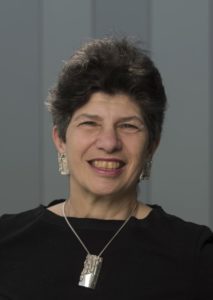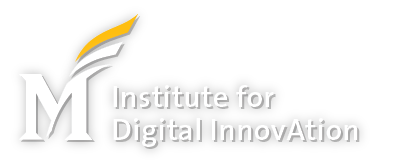Faculty Spotlight: Louise Shelley 
Louise Shelley is the founder and director of The Terrorism, Transnational Crime and Corruption Center (TraCCC) at George Mason University and a professor in the Schar School of Public Policy and Government.
The Institute for Digital InnovAtion talked with Shelley about the TraCCC.
Tell us about your Center.
The Terrorism, Transnational Crime and Corruption Center (TraCCC) is a research center at the Schar School of Policy & Government at George Mason University. TraCCC is unique in its focus on the intersection of crime, corruption, and terrorism, and on the analysis of a variety of illicit trades from this perspective.
Our recent activities since the start of the semester provide some insight into the diversity of TraCCC’s projects and collaborations that are key to our existence.
“The purpose of computing is insight, not numbers…”
“If you don’t work on important problems, it’s not likely that you’ll do important work.”
These words from Richard Hamming, one of the founders of computing, could be a motto for operating philosophy and the problems we address in our research. Our focus is on exploring how new technologies and advanced data analytics can be used to facilitate solutions for some of the most intractable social, environmental and political problems. We seek to work on problems that lead to improvement in human life and also impact the sustainability of the planet.
In August, we restarted the terrorism database that we compile annually at TraCCC for the U.S. State Department. Over the project, we have employed students with different language, cultural and geographic expertise from four different schools at GMU. Now in the fourth year of our contract, we collect detailed information on approximately 9,000 terrorism incidents each year worldwide. This data is used in the Statistical Annex of the Annual Country Reports on Terrorism released by the Counterterrorism branch of the U.S. Department of State.
At the end of August, TraCCC was recognized in a major industry prize for its work with 3M in helping to keep 52 million counterfeit masks out of global supply chains. This prize was a result of a five-year project funded by NSF on illicit supply chains that started only in October 2020.
What kinds of projects are funded?
TraCCC has won project funding from a variety of government agencies over the years, including NSF, USAID, the State, the Department of Justice, the Department of Homeland Security, as well as from foundations.
Current projects include:
- A State Department project maintaining a global database of terrorist incidents (TraCCC’s portion is approx. $3.5 million over 5 years)
- NSF EAGER: ISN: A New Multi-Layered Network Approach for Improving the Detection of Human Trafficking ($296,000)
- NSF D-ISN: TRACK 1: Collaborative Research: An Interdisciplinary Approach to Understanding, Modeling, and Disrupting Drug and Counterfeit Illicit Supply Chains ($649,000 supplemented with 2 REUs and one year-long post-doc position)
- 3-year USAID-funded project led by the World Wildlife Fund on Targeting TNRC ($495,000 over 3 years)
- A brand new CINA (DHS)-funded project on tracking illicit gold flows from Colombia and Peru and their convergence with other forms of illicit activity ($225,000)
- A newly-launched Central American initiative with initial funding by Mr. Schar
How does your project impact other disciplines?
Working with scholars across the university is key for our success. We are developing a new research model that combines science, policy, and technology in support of natural resource management, industry and human wellbeing.
A group of graduate students worked together over the summer on establishing a database on civil and criminal federal human trafficking cases that reveals the intersection of sex trafficking with the legitimate economy. Several articles, using different types of data analysis, are now being finalized based on the work conducted under this NSF project.
On Labor Day, TraCCC, which is one of the few university members of the International Union for the Conservation of Nature (IUCN) in the United States, hosted an event on corruption and sustainability in which we discussed how illicit wildlife trade both undermines sustainability and contributes to climate change.
In September, we finalized our edited volume for the TraCCC book series with Routledge on antiquities smuggling in the real and virtual world. The analysis relied on advanced data tools to understand the dynamics of illicit trade out of the Middle East and applied these tools to social media, open and the dark web data. This began as a project funded by the U.S. Department of State.
In mid-September, we hosted a webinar for the USAID-funded consortium of which we are part called: Targeting Natural Resource Corruption (TNRC). This webinar was based on data-intensive research performed at TraCCC. The event entitled, “Trade Discrepancy Analysis: A Tool to Identify Environmental Corruption and Associated Illicit Financial Flows” drew approximately 125 people from across the globe. This webinar showed how advanced data analytics can shed light on possible illicit trade in timber and related illicit financial flows. This problem of illicit trade is reducing biodiversity and contributing to climate change.
As our funded research and outreach reveal, TraCCC’s work is innately interdisciplinary as is the Schar School. Our NSF grants include a faculty member, co-PI Dr. Edward Huang, and students from the Volgenau School of Engineering. Our USAID project has included faculty and students from the Department of Environmental Science and Policy (ESP). Working closely with A. Alonso Aguirre, we were able to produce several publications on corruption, the wildlife trade, and zoonotic disease emergence. The research that results from our grants is published in journals in many different disciplines from social sciences to public health. We have students contributing to published research.
How does your Center help bring the Mason community together?
We work not only with collaborators across the campus, but publicize our relevant events throughout Mason’s Institute for Sustainability as well as the Department of Environmental Science and Policy.
We also do significant public outreach. TraCCC plays a key role as a convener, linking policy-makers, international organizations and foreign embassies to experts in academia and the private sector. With a listserv of 1,500 individuals from government, law enforcement, embassies, NGOs, as well as academics, journalists and other independent professionals, TraCCC regularly organizes panel discussions, day-long conferences, webinars and other events. Through our Anti-Illicit Trade Institute, we provide executive-level training to professionals in government, the private sector, and civil society.
How can you be reached?
To contact us or to be added to our mailing list: please write traccc@gmu.edu.

